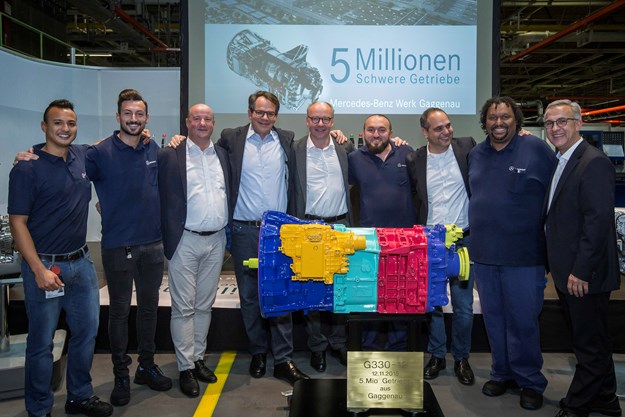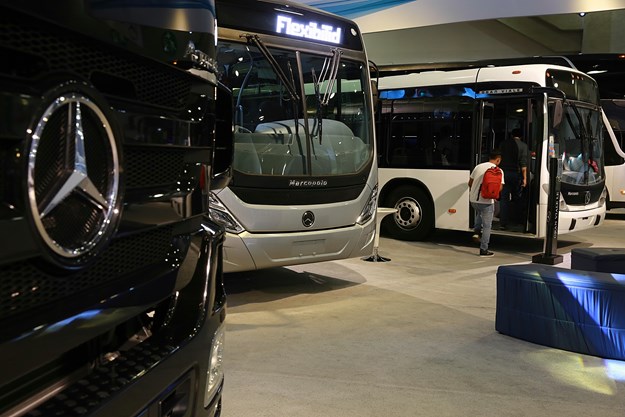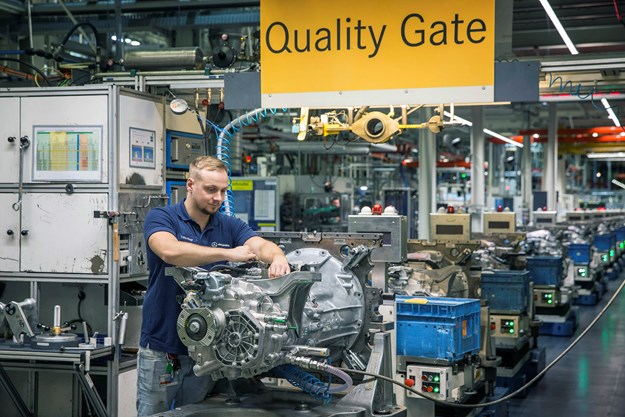A GERMAN MERCEDES-BENZ production plant that’s been making heavy vehicle transmissions since 1955 has produced its 5 millionth unit, the company reports recently.
Celebrating the huge milestone for medium and heavy-duty transmissions, the MB plant at Gaggenau – located in the northern Black Forrest (Schwarzwald) region – has successfully made transmissions for Daimler trucks and buses for more than 60 years, which have been used in seven Daimler brands worldwide.
Frank Reintjes, head of Global Powertrain, E-Mobility & Manufacturing Engineering Daimler Trucks, said: “Five million transmissions ‘Made in Gaggenau’ are an impressive milestone for both Gaggenau and our global production network. They stand for reliably high quality, for 63 years of competence and experience in the Daimler Trucks manufacturing network and not least for millions of satisfied customers worldwide.”
The special moment was reached on 12 November, 2018, with the five millionth commercial vehicle transmission leaving the production line at Rastatt’s Gaggenau plant. A proud production team watched the 12-speed automated G330 transmission ceremoniously depart the production line – which is going to be exhibited at the Rastatt plant.
GLOBAL REACH
As an FYI, the production of the first special transmissions for the Mercedes-Benz Unimog began there in 1951. Production of medium-duty and heavy-duty transmissions for trucks and buses followed in 1955. Now part of a global production network, the Gaggenau plant delivers its drive assemblies and components the world over: to the truck assembly plant in Wörth in Germany’s Rhineland-Palatinate region; to the Turkish plant in Aksaray; to Brazil, Japan, India, Mexico and the USA, for example.
The Gaggenau transmissions are fit into seven Daimler truck and bus brands: Mercedes-Benz, Setra, Fuso, Western Star, Freightliner, Thomas Built Buses and BharatBenz.
HIGH PRAISE
Matthias Jurytko, head of Operations at the Mercedes-Benz plant in Gaggenau thanked the employees for their commitment during the ceremony.
“Five million heavy-duty transmissions in 63 years once more underscores our excellent competence as a transmissions plant, as well as the huge capacity of our factory,” he said.
“The only way to successfully produce this magnitude of transmissions, and with this quality, is to have a highly qualified and motivated team work hand-in-hand with the greatest commitment. We can all be very proud of this at the plant.”
Michael Brecht, head of the Works Council also praised his colleagues,
“This is a fantastic achievement of the whole team, and each and every one should be very proud of that.”
“Especially in the last few months the workload was extremely high due to an ever increasing output.
“We have already made a lot of investments in order to increase capacity and we will continue with those in the next two years. Therefore, I would like to give my special thanks to all colleagues – you do a brilliant job!”
WHAT’S IN THE BOX?
The medium and heavy-duty transmissions are fitted in vehicles with the greatest output, the company states. These include the Mercedes-Benz Actros, the long-distance haulage truck; the Mercedes-Benz Arocs, for construction site operations; the Mercedes-Benz Atego, for short-radius distribution; as well as in touring coaches, intercity and urban buses from Setra and Mercedes-Benz.
The international vehicle brands that are fitted with the assemblies include the Freightliner Cascadia or Super Great of Fuso.
According to the company, throughout the years and during numerous development cycles the manual transmissions have become increasingly fuel-efficient and, consequently, more economic for customers.
This is mostly thanks to the aluminium housing, whose weight has been continually optimised, it’s claimed.
A further important innovation was the move from manual transmissions to fully automated manual transmissions that provide for further fuel savings, particularly in long-distance haulage thanks to finely tuned gearshift processes. The automated transmissions have been produced at the plant since the 1990s.
Truck and bus transmissions of the current generation weigh between 200 and 300 kilograms, are more than a metre in length, and house 15 individual cogs and ripples. The fully automated manual transmissions impress with easy operation, a high degree of shifting and driving comfort, as well as low fuel consumption.
IT’S ALL RELATIVE
Whilst production of the first million manual transmissions took just over 20 years, only six years were needed for the fifth million. An overview of all production milestones since 1955 is: one million by 1976; two million by 1986; three million by 1993; four million by 2012; and five million by 2018.
ABOUT THE PLANT
The Mercedes-Benz Gaggenau plant was founded in 1894 as ‘Bergmann-Industriewerke GmbH’ and is the oldest automotive manufacturing plants in the world, it’s stated.
With around 6300 employees, it is not only the biggest employer in the town but also the region’s most active company for apprenticeships.
In addition to transmissions for all Daimler vehicle divisions, planetary and portal axles, as well as torque converters for passenger cars, are also produced at this plant.
Mercedes-Benz Gaggenau is the Centre of Competence for commercial vehicle transmissions in the international Daimler AG manufacturing network.
Photography: courtesy Daimler AG, Getty Images





.png)
